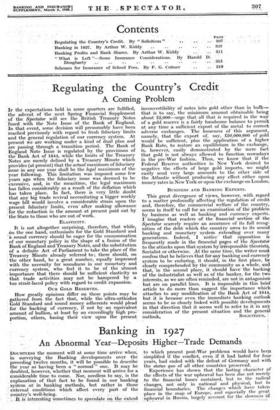Regulating the Country's Credit
A Corning Problem
IF the expectations held in some quarters are fulfilled, the advent . of the next Spring Financial Supplement of the Spectator will see the British Treasury Notes fused ,with the Note Issue of the Bank of England. In that event, some decision will presumably have been reached previously with regard to fresh fiduciary limits and the general regulation of our currency system. At present we are working under a kind of dual plan and are passing through a transition period. The Bank of England Note Issue is regulated by the provisions of the Bank Act of 1844, .while the limits of the Treasury Notes are merely defined by a Treasury Minute which provides (at present) that the actual maximum of fiduciary issue -in any one year shall be the legal maximum of the year following. This limitation was imposed some few years -ago when the fiduciary issue was deemed to be excessive, and, in ' the meantime, the legal maximum has fallen considerably as a result of the deflation which has taken place. In fact, there is very little doubt that any big trade revival necessitating a bigger weekly wage bill would involve a considerable strain upon the present fiduCiarY- limits,'even- after making allowance for the reduction in the amount at present paid out by ' the State to those who are out of work.
ELASTICITY.
It is not altogether surprising, therefore, that while, On the one hand, enthusiasts for the Geld Standard and `.11 sound currency should be eager for the consummation of our monetary . policy in the shape of afusion of the Bank of England and Treasury Notts, and the substitution of a definite Act of Parliament to take the place of the Treasury Minute already referred to ; there should, on the other hand, be a great number, equally impressed with the necessity for soundness in our monetary and currency -system, who feel it to be of the utmost importance that there should be sufficient elasticity so that trade activities may not be hampered by a too strait-laced policy with regard to credit expansion.
OUR GOLD RESERVES.
How greatly opinions differ on these points may be gathered from the fact that, while the ultra-orthodox Gold Standard and sound money adherents would plead for the backing of currency, if not by an equivalent amount of bullion, at least by an exceedingly high pro; portion, others, basing their view upon the present. inconvertibility of notes into gold other than in bulk—. that is to say, the minimum- amount obtainable being about £2,000—urge that all' that is required in the way of a gold reserve is a fairly handsome balance to permit. at any time a sufficient export of the metal to correct adverse exchanges. The looseness of this argument„ namely, that the export of, say, £20,000,000 of gold would be sufficient, plus the application of a higher Bank Rate, to restore an equilibrium in the exchange,' is, however, easily demonstrated by the mere fact that gold is not always allowed to function, nowadays in the pre-War fashion. Thus,. we know that if the Federal Reserve authorities in New York desired to negative the effects of large gold imports, we might easily send very large amounts to the other side of the Atlantic without producing any effect either upon money rates in New York or upon the exchange on London, BUSINESS AND BANKING EXPERTS.
This great divergence of views, however, with regard to a matter profoundly affecting the regulation of credit and, therefore, the commercial welfare of the country, seems in itself to call for an examination of the-Ploblem by business as well as banking and currency experts. I- imagine that readers of the financial section- of the Spectator scarcely require an assurance of its full recog- nition of the debt- which the country owes to its sound banking and monetary system extending over many generations. Indeed, I notice- that opposition is frequently made in the financial pages of the Spectator to the attacks upon that systein by irresponsible theorist* Socialist or otherwise. At the same time, the writer must confess that he believes that fel' any banking and currency system to be enduring, it should, in the first place, be clearly comprehended by the cominunity as a whole, and that, in the second place, it §hotild have- the backing of the industrialist as well as Of the banker, for the two interests, as we are often reminded, are not in antagonism but are on parallel lines. It is impossible in this brief article to do more than suggest the importance which attaches to any modification of the Bank Act of 1844, but it is because even the immediate banking outlook seems to be so closely linked with possible developments in that direction that it seems well to refer to it in any Consideration of the present situation and the general






























































 Previous page
Previous page